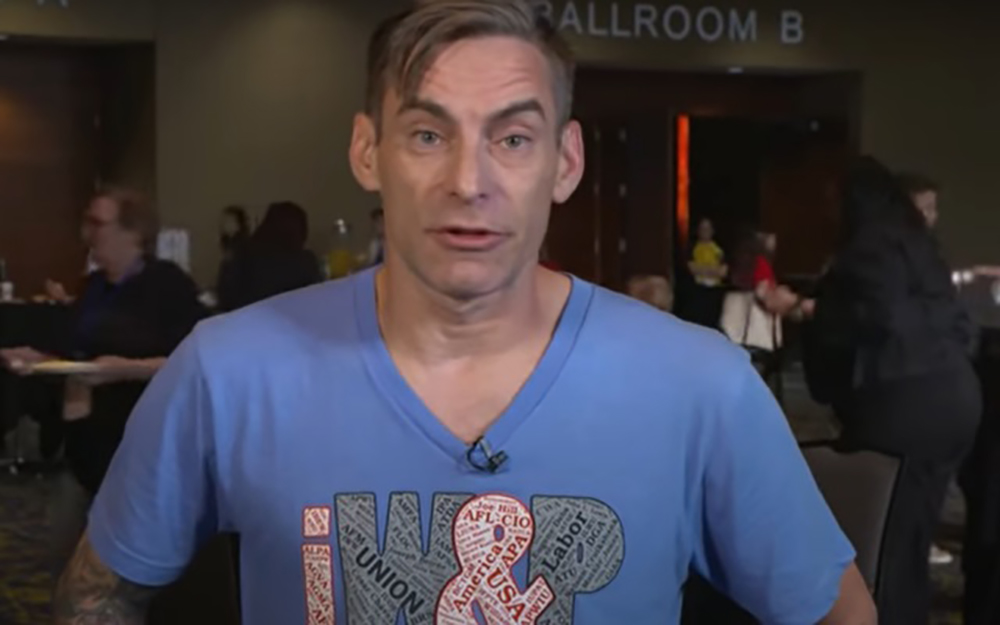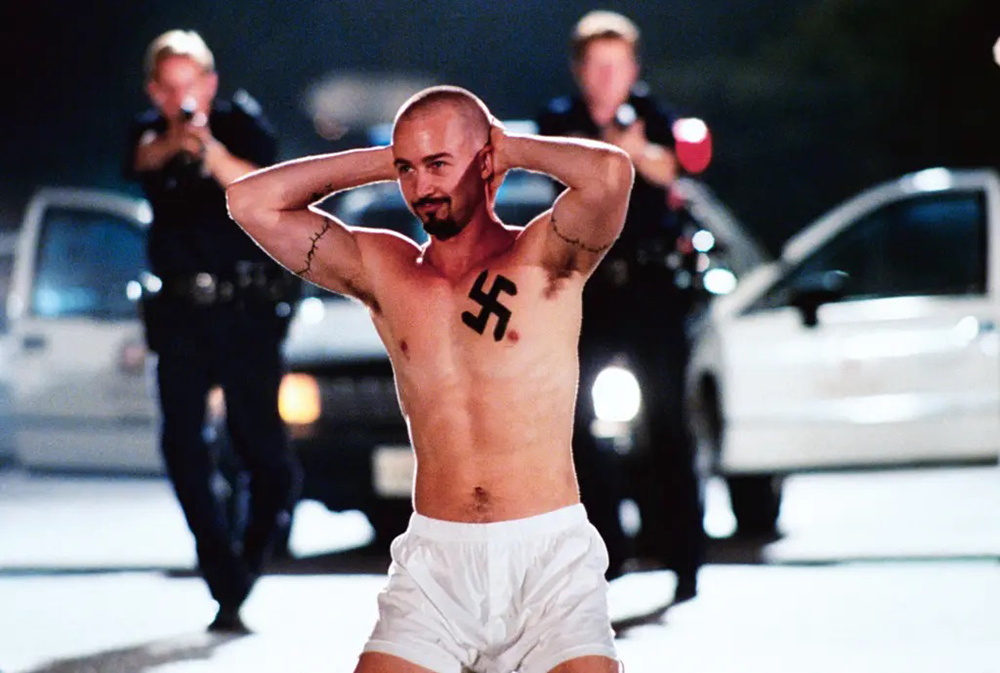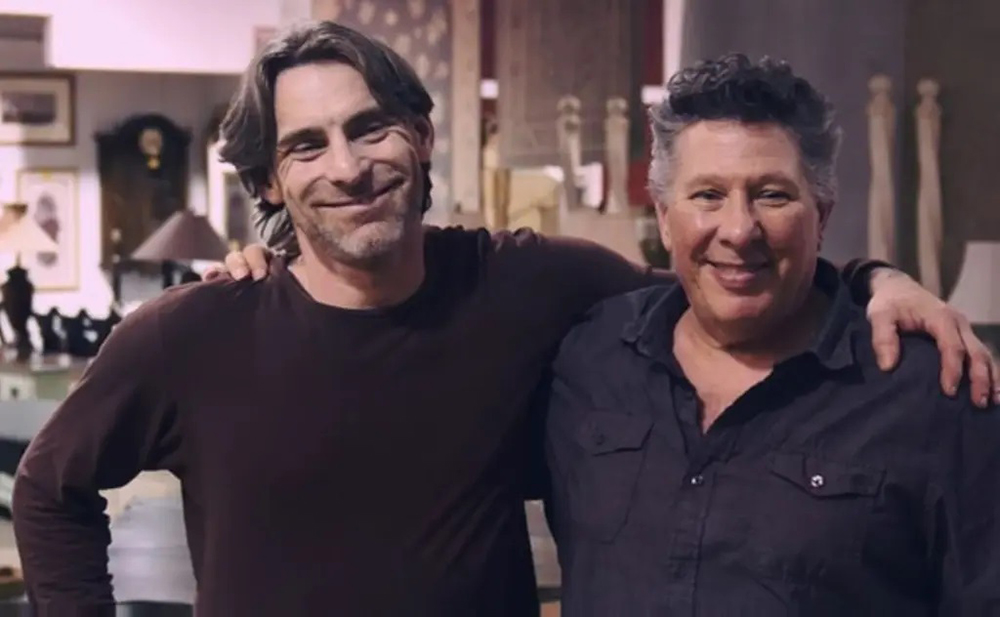|
Getting your Trinity Audio player ready...
|
Edited by: Fern Sidman
In a remarkable tale of redemption and self-discovery, Frank Meeink, once a notorious neo-Nazi leader whose life served as partial inspiration for Edward Norton’s character in “American History X,” has unveiled an extraordinary twist in his journey: he is now an observant Jew, as was recently reported in the New York Post. This revelation comes after decades of intense anti-Semitic beliefs and violent actions aimed at fomenting racial hatred.
Meeink’s story begins in the tumultuous landscape of the early 1990s when he emerged as a leader of a violent ultra-right group. His ideology was steeped in hatred, with a fervent belief that Jews were the root of all evil, culminating in the flaunting of a flaming swastika tattooed prominently on his neck, according to the information provided in the Post report. His mission was clear: to incite a race war, and he was not hesitant to resort to torture against perceived enemies.
Reflecting on his past, Meeink acknowledges the profound depths of his anti-Semitic convictions, once vehemently railing against what he termed the “Zionist occupation government,” as was revealed in the Post report. His transformation seemed implausible, considering the depths of his hatred and the violence he perpetrated in the name of his cause.
The portrayal of Derek Vinyard in “American History X,” a character partially inspired by Meeink’s journey, showcased the struggles of redemption, hinting at the possibility of change even in the most hardened hearts. Detailed in the Post report was that Derek’s transformation from a fervent neo-Nazi to a man grappling with the consequences of his past actions resonated with audiences, mirroring Meeink’s own trajectory toward redemption.

However, the most astonishing chapter in Meeink’s narrative unfolds in recent years. Despite his efforts to leave behind his neo-Nazi past and make amends, a chance remark from a friend sparked an unexpected journey of self-discovery, as per the information contained in the report in the Post. Prompted by the comment that he “looked Jewish,” Meeink embarked on a journey to uncover the truth of his heritage.
In a twist of fate, Meeink’s quest for self-discovery led him to undergo a DNA test through 23andMe, a decision driven by a desire to validate the friend’s offhand remark. The results of the test produced a revelation that defied expectations: he had Jewish ancestry, the report in the Post indicated. For Meeink, this revelation was nothing short of a divine intervention, a “beautiful gift from God” that shattered the foundations of his previous identity, he told the Post.
In an interview with The Post, Meeink shared the profound impact of this discovery on his life. “I just wanted to see if it was true, I wanted to see if it was real,” he expressed, encapsulating the mix of curiosity and apprehension that accompanied his decision to take the test. The confirmation of his Jewish ancestry marked a pivotal moment in his journey, prompting a radical shift in his perception of self and identity, the Post report added.
Through interviews with those acquainted with Meeink’s journey, his story unfolds with depth and complexity, shedding light on the forces that shaped his past and the profound changes that define his present.

The revelation of Meeink’s Jewish ancestry, however small the proportion may be, carries significant weight in light of the Jewish tradition of matrilineal descent in determining if one is considered a halachic Jew. As the test revealed, Meeink’s lineage traces back to Elizabeth Zellman Rementer, his mother’s maternal great-great-grandmother, a discovery that holds profound implications for his identity, as detailed in the Post report. While not all branches of Judaism adhere to the halachic definition of matrilineal descent, many recognize its significance, a sentiment echoed by Meeink himself as he enthusiastically embraces his Judaism.
In interviews, Meeink’s commitment to his newfound faith is palpable. He describes a daily routine steeped in tradition, praying three times a day while donning the tallit and tefillin of observant Jews. His devotion extends beyond personal rituals to communal engagement, as he attends synagogue regularly and participates in Torah study classes three times a week, the Post report explained. Additionally, Meeink has adopted a kosher lifestyle, exemplifying a deep dedication to his religious practice.
Understanding the origins of Meeink’s tumultuous journey sheds light on the complexities of his transformation. Raised in an Irish-Catholic enclave in southwest Philadelphia, Meeink’s formative years were marked by adversity and turmoil, exacerbated by an abusive stepfather, according to the information in the Post report. Surrounded by black families, Meeink’s perceptions of race were shaped by fear and prejudice, sentiments reinforced by encounters with his neo-Nazi cousin and his skinhead associates.
Recalling his early encounters with the neo-Nazi movement, Meeink reflects on the allure of belonging and purpose that it offered. Meeting prominent figures such as David Duke and immersing himself in the ideology of white supremacy, Meeink found validation for his fears and grievances. “I grabbed onto this information that was being fed to me,” he recalls, according to the Post report, as he highlights the seductive power of extremist ideologies in providing a sense of identity and belonging.
By the age of 15, Meeink had already embarked on a path of radicalization, joining and subsequently being expelled from the Ku Klux Klan before forming his own group with his cousin, aptly named Strikeforce, as was revealed in the Post. His involvement in the white supremacist movement was driven by a desire to amplify its reach and influence, fueled by a potent mix of fear, anger, and disillusionment.
Using the Bible as a tool to spread his message of hate, he drew parallels with Hamas terrorists who weaponize the Quran, highlighting the universality of extremist rhetoric across religious boundaries. The Post report explained that his public-access cable TV show, ominously titled “The Reich,” served as a platform for propagating racist ideologies through skits and jokes, a chilling testament to the depths of his commitment to white supremacy.
Central to Meeink’s narrative is his animosity towards groups such as Skinheads Against Racial Prejudice (SHARP), whom he despised for their anti-fascist stance. Meeink’s antagonism towards SHARP manifested in extreme violence, exemplified by the harrowing account of his abduction and torture of a member of the group on Christmas Eve in 1992, the Post report detailed. Recalling the incident, Meeink’s words resonate with chilling indifference as he describes the use of firearms and hours of torture devoid of remorse or empathy, painting a portrait of a young man consumed by hatred and cruelty.
At the age of 17, Meeink’s actions caught up with him, resulting in a three-year sentence for aggravated kidnapping. Incarcerated within the confines of the Illinois Department of Corrections, he found himself amidst a milieu of Aryan “farm boys and bikers,” surrounded by individuals who shared his extremist views, as per the information in the Post report. However, an unexpected turn of events would set Meeink on a path towards redemption.
Bonding with two black inmates, nicknamed Jello and G, over games of football and cards in the prison yard, Meeink experienced a gradual awakening from the grip of neo-Nazism. Their camaraderie transcended racial divides, offering Meeink a glimpse of humanity beyond the narrow limitations of his hatred. The Post reported that this unlikely friendship served as a catalyst for his transformation, inspiring a journey of introspection and self-discovery that would ultimately shape his future.

Emerging from prison after just over a year, Meeink’s newfound perspective led him to confront the contradictions within his own beliefs. Attending neo-Nazi rallies, he found himself at odds with the pervasive racism directed towards black people, challenging the narratives that once defined his worldview. Yet, his deep-seated anti-Semitism remained steadfast, a testament to the complexity of ideological indoctrination and personal biases, as was explained in the Post report.
Reflecting on his journey, Meeink’s words encapsulate the tumultuous path towards reconciliation and redemption. “I would hear them say all black people are this way,” he recalls, the Post reported, acknowledging the fallacy of racial stereotypes.
In 1994, amidst the throes of unemployment and addiction, Meeink found himself at a crossroads when offered a job at an antiques store in Cherry Hill, New Jersey, by its Jewish owner, Keith Brookstein. Despite harboring deep-seated prejudices, Meeink hesitantly accepted the offer, grappling with the weight of his past and the specter of his own bigotry, as was indicated in the Post report. His tentative inquiry to a friend about whether he had disclosed his swastika tattoo to Brookstein elicited a response that would alter the course of his life: “Keith doesn’t give a rat’s a-s what you believe, just don’t break his furniture.”
Brookstein’s unwavering kindness and willingness to extend forgiveness in the face of Meeink’s past transgressions resonated deeply with the young man. It was a transformative moment, as Meeink reflects, “Who are you to judge the world, you’re a f—ing criminal, a drunk. That was the day I was like, ‘I’m done. I’m out,’” he told the Post. In a symbolic gesture of his newfound resolve, Meeink refrained from shaving his head the next morning, marking the beginning of his journey towards reconciliation and redemption.
Subsequent actions further underscored Meeink’s commitment to transformation. Removing the swastika tattoo and the word “skinhead” from his knuckles symbolized a definitive break from his past ideology, signifying a repudiation of hate in favor of embracing a future defined by compassion and understanding, the Post report observed.
However, it is Meeink’s embrace of Judaism that has emerged as the cornerstone of his redemption. In the wake of the darkest period of his life, marked by the loss of his son, his mother’s tragic overdose, and the dissolution of his marriage, Meeink found solace and guidance in his faith. Recounting his journey to recovery in Los Angeles, Meeink speaks fondly of his sponsor, a Jewish man he affectionately dubs his “recovery rabbi,” whose support and guidance played a pivotal role in his path towards sobriety and spiritual renewal, the Post report noted.
Reflecting on his arduous journey, Meeink acknowledges the challenges he has faced in confronting his past and embracing his newfound identity. “It was a lot of work,” he recalls, underscoring the profound personal transformation that has taken place within him, as was pointed out in the report in the Post.
“In recovery, it says, ‘Find the God of your understanding,’” Meeink reflects, highlighting a pivotal moment in his quest for spiritual enlightenment. This introspective journey led him to explore the tenets of Judaism, drawn to its emphasis on love and the freedom to worship according to one’s own understanding. “The thing I loved about Judaism is that it says, ‘Love the Lord your God.’ And that you don’t need to force your God on nobody else,” he explained during his conversation with the Post, as he underscored the inclusive nature of his newfound faith.
For Meeink, faith has become a source of humility and compassion, guiding his interactions with others and shaping his worldview. “My faith granted me humbleness and humility that enabled me to stand up for others,” he asserted during his interview with the Post as he highlighted the transformative power of spiritual awakening in fostering empathy and understanding.
Throughout his journey, Meeink remains committed to incorporating the principles of his faith into his daily life. On his morning prayer walks, he meditates on the word “stay,” a poignant reminder to shift his focus away from self-absorption towards a broader perspective. “S-T-A-Y: stop thinking about yourself,” he emphasizes, encapsulating the essence of his spiritual practice.
Central to Meeink’s journey of faith is his relationship with his “recovery rabbi,” whom he calls every morning at 8 a.m. This ritual serves as a reminder of his commitment to keeping God at the forefront of his life, grounding him in a deeper sense of purpose and connection. “I only do these things, not to just seem like a part of the Jews,” he explained to the Post, emphasizing the sincerity of his devotion.
In 2020, Meeink took his advocacy against hate to the highest levels, testifying before Congress about neo-Nazis’ attempts to infiltrate police forces. As was reported by the Post, his courageous testimony shed light on the insidious nature of extremism and placed an emphasis on the urgent need for action to combat hate and intolerance.
Looking to the future, Meeink envisions his remarkable journey translated onto the silver screen, with talks underway for a movie that would serve as a sequel of sorts to “American History X,” as was revealed in the Post report. Collaborating with director Sam French, Meeink seeks to share his story with a broader audience, imparting a simple yet profound message: “Love is more powerful than hate.”
In a world often marred by division and discord, Frank Meeink’s journey stands as a beacon of hope and inspiration. Through his unwavering commitment to faith and redemption, he reminds us of the transformative power of love and the resilience of the human spirit in overcoming even the darkest of adversities. As he continues to navigate his path forward, Meeink’s story serves as a testament to the enduring strength of the human soul and the limitless potential for growth and renewal.




